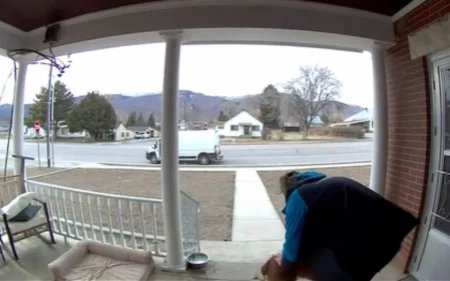A Heartfelt Rescue: Abandoned Puppies Find Hope Through Compassion
In a touching display of humanity, a West Virginia woman recently took action after learning about two puppies abandoned in the woods, documenting her rescue mission in a video that has since captured hearts across social media. The footage, shared on TikTok under the username @griffeychronicles on October 18, has resonated deeply with viewers, accumulating over 1.7 million views and nearly 290,000 likes. The rescuer explained her motivation simply yet powerfully: “I saw a Facebook reel of a lady caught dumping her dogs and couldn’t stop thinking about them.” Driven by compassion and urgency, she added, “I knew I had to go and see if I could catch them. I knew it would only get harder to do with time, or they would get killed.” This immediate response highlights how individual action can make a profound difference in the lives of vulnerable animals, especially when time is of the essence.
When the woman arrived at the location where the puppies had been abandoned, she discovered a heartbreaking scene that speaks volumes about the loyalty of dogs even in the face of betrayal. “They were still there waiting,” she wrote. “They spent the night there, and waited for their owners to come back.” Her frustration is palpable in her questioning: “I don’t understand. You just turn your dog out, drive off, go to sleep at night, and just… forget about them?” This moment captures the painful reality of pet abandonment—while humans may walk away, these animals often remain, faithfully waiting for owners who never return. The contrast between the callousness of abandonment and the unwavering loyalty of these puppies creates a powerful emotional narrative that helps explain why the video resonated with so many viewers.
The rescue itself was not immediate but required patience and gentle persistence. For about an hour, the woman worked to gain the puppies’ trust, using small pieces of ham as enticement. Her efforts showcase the delicate process of helping traumatized animals—building trust takes time, especially with creatures who have experienced abandonment. “They didn’t want to leave, they wanted you, they wanted home,” she wrote, addressing the absent former owners. “But they deserve home.” This poignant observation highlights how animals often remain loyal even to those who have mistreated them, while simultaneously affirming that these puppies deserve better than what they had experienced. The successful rescue represents not just physical salvation but the first step in a healing journey for these animals.
In sharing her experience, the rescuer addressed the broader issue of pet abandonment with candor and compassion. “I won’t ever understand how you do this,” she wrote. “Yes, shelters are full, yes, you deal with criticism when you post your animals for rehoming. But the answer should never be to just set them out and let them figure it out.” Her words acknowledge the challenges pet owners might face while firmly rejecting abandonment as a solution. She concluded with relief about these particular puppies—”Thankfully, these babies have rescue and will find good homes”—while acknowledging the darker reality that “so many aren’t so lucky.” This balance of hope for the specific animals she helped, coupled with awareness of the larger problem, invites viewers to consider their own responsibility toward vulnerable animals in their communities.
This rescue story occurs against the backdrop of a significant national challenge. According to the American Society for the Prevention of Cruelty to Animals (ASPCA), nearly 3 million homeless dogs entered shelters across the United States in 2024 alone. The statistics tell a sobering story: while approximately 2 million dogs were adopted last year, over 334,000 were euthanized—often due to shelter overcrowding caused by the continuous influx of new animals being found or surrendered daily. More than half a million dogs were returned to their owners, and another half-million were transferred to other organizations. These numbers contextualize the individual act of abandonment that prompted this rescue mission, revealing it as part of a much larger pattern of animal displacement and vulnerability throughout the country.
What makes this story particularly resonant is how it demonstrates that individual action matters profoundly in the face of overwhelming statistics. While systems and organizations struggle with the scale of pet homelessness, this woman’s decision to drive to the woods, spend an hour gaining the puppies’ trust, and ensure their safe future represents the kind of direct compassion that changes lives—even if just two at a time. Her documentation of the rescue has amplified the impact beyond these specific puppies, potentially inspiring others to similar acts of kindness and raising awareness about abandonment. As shelters continue to face capacity challenges and animals remain at risk, this viral moment serves as a reminder that empathy in action can create ripples of positive change, one rescue at a time—and that behind the statistics are individual animals waiting for someone who cares enough to help.














